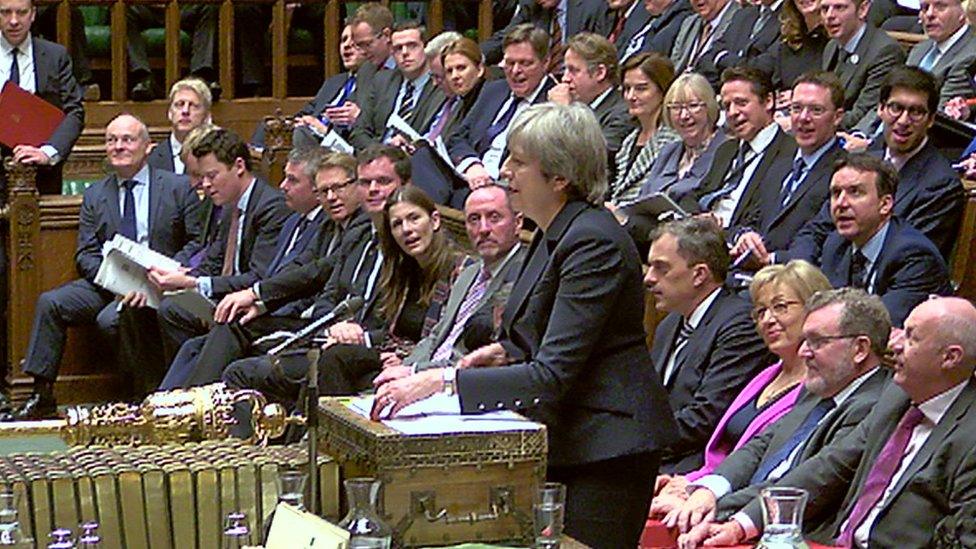Theresa May says 'good progress' made on Brexit
- Published
- comments

Theresa May insisted "very good progress" was being made in Brexit negotiations - as the DUP said there was "more work to be done".
Mrs May appeared in Prime Minister's Questions after a phone call with DUP leader Arlene Foster, who has refused to support draft plans for the border.
One Tory MP said the PM's "red lines" on Brexit looked "a little bit pink".
Labour leader Jeremy Corbyn said the government should "get out of the way" if it couldn't negotiate a deal.
On Monday Northern Ireland's Democratic Unionist Party - whose support the PM needs to win key votes at Westminster - objected to draft plans drawn up by the UK and the EU.
The DUP said the proposals, which aimed to avoid a "hard border" by aligning regulations on both sides of the border between Northern Ireland and the Republic of Ireland, were not acceptable. Dublin says it wants firm guarantees that a hard border can be avoided.
This has left the UK government racing to find an agreement suiting all sides in time for next week's EU summit.
Following Mrs May's call with Ms Foster, a DUP spokesman said discussions were continuing and there was "more work to be done".
Citizens' rights, the Irish border and money are the three big negotiation points
Mrs May also spoke on the phone with Ireland's Prime Minister Leo Varadkar, who "reiterated the firm Irish position", according to his spokesman.
Mr Varadkar also told parliamentarians in the Irish Dail that talks on the Irish border question could resume in the New Year if agreement could not be reached next week.
In response, Downing Street said it was focused on next week's summit, and the DUP's Nigel Dodds said the comments increased the likelihood of no trade deal being reached.
"Mr Varadkar may try to appear calm on the surface, but he is playing a dangerous game - not with us but with his own economy," he said.
'More red paint'
In PMQs, Mrs May was asked by DUP MP Jim Shannon to ensure there would be no "constitutional, political or regulatory" barriers between Northern Ireland and the rest of the UK.
She said the short answer was yes, adding that the Brexit settlement would respect the UK's "constitutional integrity" and "internal market".
She said that finding a way to leave the customs union and single market while avoiding a hard border was the "whole point" of Brexit negotiations about future relations.
Sir Keir Starmer tells Today he wouldn't rule out staying in customs union post Brexit
But the EU says talks about the future can only happen when enough progress has been made in agreeing what will happen at the Northern Ireland border.
The suggestion of "regulatory alignment" between Northern Ireland and the European Union - which emerged on Monday - has concerned some Eurosceptic Conservative MPs.
During PMQs backbencher Jacob Rees-Mogg proposed a new coat of red paint for Mrs May's negotiating "red lines".
She responded by referring to her previous speeches setting out her negotiating goals, adding: "Those principles remain."
'Not credible'
Labour says the option of staying in the EU's customs union long-term should be kept "on the table" in negotiations and has criticised the government for ruling this out.
At the 14-15 December summit, European leaders will decide whether enough progress has been made in the negotiations on Ireland, the UK's "divorce bill" and citizens' rights so far to open trade talks.
Chancellor Philip Hammond has suggested the UK could pay the so-called Brexit bill, regardless of whether or not there is a subsequent trade agreement with the EU.
He told MPs on the Commons Treasury Committee that he found it "inconceivable" that the UK would "walk away from an obligation that we recognised as an obligation".
"That's just not a credible scenario," he added. "That's not the kind of country we are. And frankly it would not make us a credible partner for future international agreements."
A No 10 spokesman said the government's position remained that "nothing is agreed until everything is agreed and that applies to the financial settlement".
Reports have suggested the UK has raised its financial offer to a figure of up to 50bn euros (£44bn).